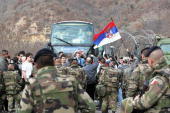 Today Anders Fogh Rasmussen, the new NATO secretary-general, is visiting Kosovo as part of his get-to-know-the-job tour. What is so remarkable about this particular visit is, well, that it’s so unremarkable. That there is so little attention paid to the newly-independent country at all.
Today Anders Fogh Rasmussen, the new NATO secretary-general, is visiting Kosovo as part of his get-to-know-the-job tour. What is so remarkable about this particular visit is, well, that it’s so unremarkable. That there is so little attention paid to the newly-independent country at all.
Those, particularly on the Left, who railed against the war – and Kosovo’s declaration of independence almost ten years after NATO’s air campaign – have moved on. Their interest in Kosovo, let alone the Western Balkans, was instrumental.
Those who predicted that the declaration of independence would spark another cycle of violence and the election of irredentist Serbs in Belgrade were wrong. Violence has been minimal and moderate parties have won the last two elections in Serbia.
For this, credit goes to three parties in particular: the new Kosovo government, which has gone for the higher moral ground, Pieter Feith, the skilful Dutch diplomat charged with overseeing the move to independence on behalf of the EU, and the Belgrade government, which has focused on Serbia’s European future rather than Kosovo and the past.
There are still many challenges in Kosovo. The fledgling country is mired in corruption and strong-arm politics. Power is not sought, or wielded, for the common good – but rather to benefit a network of friends, family and other clients. As Ramsi Lani, an Albanian scholar, puts it: “crime is organised but the state is disorganised”
The country’s Serb minority seem particularly disadvantaged.
North of the Ilbar River, where Serbs form a majority they run parallel public institutions and hanker for integration with Serbia proper. Elsewhere in the province, the Serb minority feel beleaguered, refusing to accept their new reality and ever-fearful that the Belgrade will forget them. Spoilers have been heartened by the opposition of several EU states to Kosovo’s independence.
But this is far better than anyone could have hoped for a decade ago, when the Serbian army slaughtered civilians and Kosovar para-militaries vowed revenge.
Once in the new country, where his daughter served as a NATO soldier, Fogh Rasmussen will likely announce that NATO intends to cut its number of peacekeepers from 14000 down to 10000, no doubt hoping that European countries will be more willing to augment the alliance’s Afghan mission. It’s likely that within two years the Kosovo mission will be run by the EU.
But NATO’s draw-down will require Europe to think through how to solve Kosovo’s remaining problems and, above all, improve its mission to combat Kosovo’s crime. Last week’s killing of four police officers in neighboring Albania shows how far the region still has to go to deal effectively with organised crime.






Comments